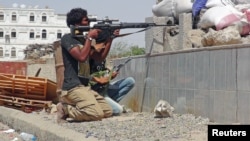An Iranian naval convoy suspected of possibly trying to deliver weapons to Yemen’s Houthi rebels appears to be on its way back to Iran, avoiding a potential face-off with the United States.
Pentagon spokesman Colonel Steve Warren said Friday the nine-ship convoy had left the Gulf of Aden and was now sailing in international waters off the coast of Oman, possibly on course to head back to Iran.
“It’s fair to say that this appears to be a de-escalation of some of the tensions that were being discussed earlier in the week,” Warren said.
The U.S. has been closely watching the Iranian flotilla since it left the Persian Gulf last week. Officials raised concerns the convoy’s seven cargo ships could contain weapons or other supplies for Houthi rebels, citing Iran’s history of supplying them with armaments in the past, a charge Iran denies.
US warships
Earlier this week, the U.S. sent the aircraft carrier USS Theodore Roosevelt and the guided missile cruiser USS Normandy to join seven other U.S. warships in the region.
Pentagon officials cited a deteriorating security situation in Yemen that could result in a maritime threat, adding the presence of the Iranian convoy was "certainly one of the factors."
At one point, U.S. officials said the USS Theodore Roosevelt was within 200 miles of the Iranian vessels, adding they are not sure why the Iranian convoy decided to change course.
“There were no communications or encounters between those ships and U.S. forces,” Warren said. “We do not know their future intentions.”
U.S. Central Command spokesman Col. Patrick Ryder added, “we have not been communicating with the Iranians, in regards to their [vessels] from a U.S. Central Command standpoint that I’m aware of.”
Ryder also said a U.S. team in Saudi Arabia is continuing to provides the Saudis with some intelligence and logistics support as they “may continue to conduct limited operations to counter certain ongoing Houthi military actions in Yemen.”
Kerry backs Saudi strikes
U.S. Secretary of State John Kerry expressed support Friday for the Saudi-led airstrikes as long as the rebels persist in attacking Yemeni government forces.
Kerry told reporters after a meeting in northern Canada that the Houthi rebels must stop fighting and enter negotiations.
Former Yemeni President Ali Abdullah Saleh also urged the rebels to comply with a U.N. resolution that obligates them to withdraw from cities they occupy so that peace talks can begin. The rebels are fighting alongside military units loyal to Saleh. The former president did not call for a cease-fire from the military forces.
While expressing concern for civilian casualties, Kerry credited the Saudis with making an important shift from a full-scale air campaign to hitting targets only when militants present a threat or try to seize more areas.
Saudi Arabia announced an end to its month-long air campaign against Shi'ite Houthi rebels in Aden, Sana'a and other parts of Yemen just three days ago.
The United Nations said Friday the civilian death toll since the bombing started late last month is estimated at 551.
The U.N. children's agency, UNICEF, said at least 115 children were among the dead; UNICEF spokesman Christof Boulierac called that figure conservative.
“We also confirm that at least 140 children were recruited as child soldiers, at least 30 schools were damaged or occupied by parties to the conflict, and 23 hospitals were attacked" since March 26, Boulierac said.
After a brief calm in the Yemeni capital, Sana'a, the airstrikes continued on Friday, despite Saudi Arabia's declared end to the bombing campaign.
Warplanes struck sites in Sana'a and elsewhere suspected of being used by the rebels to store weapons or deploy troops, while fighting raged between the Iranian-backed Houthis and supporters of exiled President Abd-Rabbu Mansour Hadi.
The monthlong bombing campaign has created a severe humanitarian crisis in Yemen, but has largely failed to dislodge the Houthis.
The death toll in Yemen stands at nearly 1,100 people, with about 4,300 wounded and more than 150,000 displaced since March 19, according to the U.N. Office for the Coordination of Humanitarian Affairs.
The Houthis have taken over large parts of Yemen and have forced the country's Western-backed leader, Abd-Rabbu Mansour Hadi, to flee to Saudi Arabia.
Human rights issues
The U.N. Human Rights Office said the total number of killed and wounded in the Saudi-led coalition airstrikes would be considerably higher were figures regarding combatants included.
In addition, the agency said at least 64 public buildings had been damaged or destroyed. It said it was receiving many disturbing reports of civilians being arbitrarily detained and otherwise abused.
Aid agencies have warned that fuel supplies and other basic commodities are running dangerously low in Yemen. The World Food Program said 12 million people throughout the country were going hungry, a 13 percent increase since the conflict escalated a month ago. Despite the dangers, WFP and its partners are continuing to deliver food to more than 100,000 displaced people taking refuge around Aden.
WFP spokeswoman Elizabeth Byrs said the agency was planning to provide emergency food assistance to 2.5 million people throughout the country over the next three months. But she added that there was an urgent need for a so-called humanitarian space to allow food to be distributed to civilians trapped in conflict areas.
“The lack of fuel, including the restriction on importation, is affecting WFP operational ability to provide food assistance. Additionally, for the beneficiary population, there are challenges to cook food commodities. There is an urgent need to allow the importation of humanitarian fuel,” she said.
Lisa Schlein contributed to this report from Geneva.




